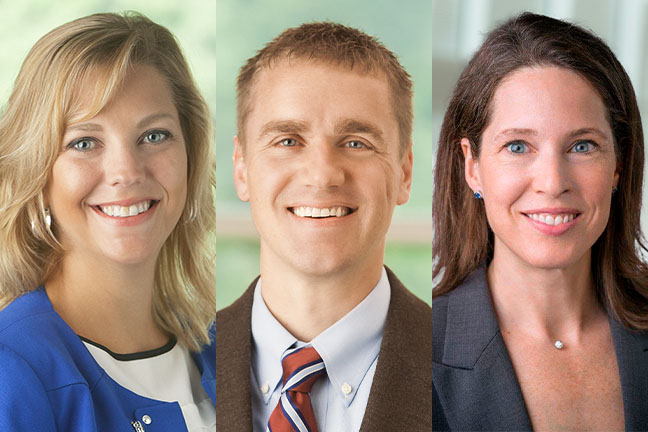See how UNMC’s Department of Internal Medicine is growing its fellowship programs. The following stories appeared in the department’s 2022 Biennial Report, which was published earlier this year.
Allergy division launches new fellowship program
A new fellowship program in allergy and immunology will help fill a big gap in allergists in Nebraska.
The two-year program, which began July 2022, is focused on training to master proficiency in evaluation, diagnosis and management of pediatric and adult patients with allergic and immunologic diseases. Trainees will be prepared to work in the academic or private sector when training is completed, said Sara May, MD, associate professor in the UNMC Department of Internal Medicine’s Allergy and Immunology Division and fellowship program director.
The two-year fellowship is open to residents and physicians nationwide who have graduated from an Accreditation Council for Graduate Medical Education-accredited residency program in internal medicine, pediatrics or medicine-pediatrics. Fellows will be trained in conditions including allergies, asthma, drug, food and environmental allergies, allergic skin diseases such as contact dermatitis, hives and eczema and immune system diseases, primarily immunodeficiencies.
Fellows will have eight hours a week dedicated to didactics divided into two, four-hour blocks.
“Allergic diseases are quite common and are increasing,” Dr. May said. “Demand for the specialty is high, and the fellowship will help alleviate a shortage of physicians trained in this specialty. We’re excited and thankful for the support of leaders at Nebraska Medicine, Children’s Hospital & Medical Center and the Omaha VA, where fellows will see patients.”
Two fellows will be recruited the first year. The fellowship also will expand educational capacity for additional learning including medical students, resident physicians and fellows.
Infectious diseases division expands fellowship
The COVID-19 pandemic has shown an even greater need for infectious diseases physicians.
“Fellows are essential to the success of our division,” said Trevor Van Schooneveld, MD, fellowship program director for the UNMC Division of Infectious Diseases. “Fellows expand our clinical reach, encourage our educational environment and enhance our research. Plus, they make ID practice more fun for faculty.”
The program has been growing steadily since its creation nine years ago. Initially, it accepted one fellow per year, but as the division grew so did the fellowship. In 2021, for the first time, six ID fellows (three each year) were enrolled in the two-year program.
The division recently received a gift to support a third year of fellowship, which will help build the fellow’s portfolio of clinical and research experiences and prepare them to work in an academic- and research-focused environment.
Nephrology’s fellowship expansion increases clinical experience
When UNMC expanded its fellowship program, it also broadened clinical opportunities for fellows.
“The expansion has allowed our curriculum to be more flexible,” said Scott Westphal, MD, associate fellowship program director. “It’s also allowed for a better educational and clinical workload balance and created additional outpatient opportunities, especially for first-year fellows.”
Historically, first-year fellows did predominantly inpatient work, Dr. Westphal said. Now, their training includes earlier exposure to outpatient clinics, in-center and home dialysis units and interventional nephrology experiences.
Troy Plumb, MD, fellowship program director, said the time was right — with heavy clinical workloads, high patient volumes and strong educational opportunities — to officially expand the division’s two-year fellowship program from four fellows to six.
Despite a decreasing interest in nephrology at the national level, UNMC has been successful in recruiting high quality nephrology fellows. “We have a phenomenal group of fellows,” Dr. Plumb said. “As a division, we are dedicated to education and have outstanding educators that routinely win division, departmental and institutional teaching awards.”
Both physicians said the UNMC nephrology team will continue to highlight the allure of nephrology to medical students and residents, both at UNMC and elsewhere.
Together, the team promotes work/life balance, Dr. Plumb said, and uniquely provides broad exposure to general and consultative nephrology including ICU nephrology, expanded kidney transplant and interventional nephrology, with in-center dialysis and a robust home dialysis population, including one of the top 10 largest home hemodialysis programs in the country.
Rheumatology’s expanded fellowship, intake clinics result in success
One of the county’s largest and best fellowship programs just got bigger.
UNMC has expanded its two-year clinical rheumatology fellowship program from four positions annually to six (three each year of training).
“We’re excited to grow the program to help address our current and future rheumatology workforce shortage — both locally and nationally,” said Amy Cannella, MD, professor of internal medicine and fellowship program director.
The expanded footprint enables UNMC to further enhance its fellowship experience with a variety of clinical and research opportunities to ensure fellows have all the tools needed to be successful. “We’re proud to provide an education over service-oriented fellowship,” she said.
Accredited in 2005, the program boasts a 100% first-time board pass rate. “We are flexible, in order to provide individual training to best fit each fellow’s needs, whether they plan to practice in a rural, urban, private, academic, VA or industry setting,” Dr. Cannella said.
The program will continue to develop training tracks for different clinical and research experiences, she said, noting “we try to find opportunities to promote each individual fellow.”
As part of the fellowship expansion, Dr. Cannella said three new intake clinics were created after fellows wanted more experience in evaluating new patients. The clinics, run by fellows with faculty supervision, now exist at the Brentwood, Village Point and VA locations, and provide dedicated spots for urgent patients to be seen.
The team also is proud of its state-of-the-art training in ultrasound and strong mentoring and productivity in fellow research and scholarly activity. This is evidenced by UNMC rheumatology fellows winning two of the past five Marshall Schiff Awards for fellow of the year from the American College of Rheumatology.
